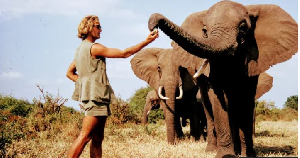By Kent Mensah
The deafening sound of children shouting fills the air. Sounds like a heated bout of fisticuffs. Thumping bare feet vibrate on the arid ground. Dust billows into the hot skies. Fear of an area gangs’ brawl intensifies as one draws closer. The sight of a round but soft leather object bouncing and rolling across the street into a choked gutter deflates the heightened fear.
Just a few metres away from the self-made drainage alley are a chain of school bags. It is difficult to notice what they are, but their handles expose them. School uniforms cover a better part of them. Hugging them from behind are pairs of dirty socks. They belong to the school children now turned players who have taken over an uncompleted building and turned its wide hall into a playing pitch.
It is football time. Forget about home work. Household chores can wait. The day is never complete without the slightest chance to engage in the 'leg battle'. A battle that usually ends with satisfaction and smiles. They will get home late drenched in sweat.
Football is the official natural childhood game for Ghanaian children. It is suicidal to hate football as a child. Dare you fall in love with ‘B’ ball [basketball] or ‘TT’ [table tennis] and you will forever get the tag ‘Mama Ba’, or mommy’s boy. Indoor games are reserves of the high class in society because they can afford them, but the beautiful game belongs to the masses.
Football is a culture to most Ghanaians, and especially the lower class. They worship it. They believe their destiny is in the hands of the game. Thousands of unemployed youths have taken to football because they see a gold mine in the prospect. The success stories of African football stars in top European leagues keep inspiring them.
Just across the uncompleted building turned a miniature park is Michael Acquah with his mates on a pebbly playing field. Acquah was born in James Town, then known as British Accra during the colonial era in the capital, Accra.
His ambition is to become a professional goalkeeper anywhere in Europe. He trains daily with his friends in the area. Owning a pair of gloves and boots would be dream come true. His only tools are his bare hands and feet. Yet he keeps that dream alive.
“I can’t go and steal. I can’t go and box. Football is what I can do and I do it better than anything else,” 15-year-old Acquah told Goal.com.
The European dream
As Acquah sweats under the burning sun with his naked feet firmly clutched on the baked gravel, he keeps a dream that he hopes to achieve when the opportune time strikes.
“I want to make my family proud. I want to be like Edwin van de Sar [Manchester United goalkeeper] or Black Stars keeper ‘Olele’ [Richard Kingson]. I want to take care of my parents and have a sound family. I want to be a professional footballer and this is the way to start.
"I want to make my family proud. I want to be like Edwin van der Sar."
- Michael Acquah, 15
“I can make it. I know I can make it to Europe. I want to play for either Chelsea or Barcelona. They are my dream teams. I always dream wearing their jerseys competing in the Uefa Champions League,” said Acquah, unveiling what would seem to many an overly ambitious expedition.
However, that has been the beginning of the journey of most of the African football icons overseas. It is on such dusty pitches that scouts spotted the likes of the only African to have become the world’s best player, George Weah.
The area football on uneven parks as well as unstructured community leagues brought the likes of Ghana’s Stephen Appiah to the limelight. Playing at car parks groomed the goal scoring feet of Ivory Coast’s captain Didier Drogba. All these players and countless others have been very successful in Europe.
Generally, standard playing fields in terms of size and even surface are nonexistent in most communities in Ghana. People create parks for themselves on the sight of small openings. Some quench their football thirst beside streets while others get the blessing of land owners to play on their undeveloped lands to prevent weeds from growing on them.
In order to satisfy everybody, Ghanaians usually enjoy playing the 'small poles' to accommodate about two to three games simultaneously depending on the size of the field. At certain places, games are often interrupted in a space of every 30 to 45 minutes to give way to passing vehicles. The fields are bald. Erosion has caused shallow gutters in between. Sharp stones sometimes lurk around the goalmouth. Going home with bruises on the body is the norm.
Football is in their blood
In spite of these challenges, Africans in particular and Ghanaians in general make it into the top flight leagues in Europe. So what really motivates them? Evans Ocansey, a counselling and guidance teacher believes it is the mindset.
“What you tell the mind is what you become. They have locked their minds that they want to become football stars and that is where it leads them despite all the challenges we have here in Africa.”
Football is their blood. They take every opportunity to play. Give them five years and you’ll see them in the Premier League then the junior national teams and finally they are on a transfer to Europe. Until they achieve this aim, nothing can stop them, not even education,” Ocansey emphasized.
A gifted colts player Francis Kpakpo Adotey has corroborated Ocansey’s argument. “I have lost a lot of admirers, relatives and friends because I have chosen football ahead of education. It’s a tough decision and I understand them perfectly, but I know I can also make it in football,” Adotey once told Goal.com in a scouting report.
Adotey and Acquah, mentioned earlier, represent thousands of the Ghanaian youths defying the dusty air on the pitches and the scorching sun, hoping and praying to catch the eyes of scouts that will offer them another step to climb on the long road to Europe, where the neatly laid carpet grasses at the stadiums make even diving enjoyable after scoring a goal without the fear of any bruise.
Sports Features of Friday, 6 May 2011
Source: Kent Mensah
From the dusty football parks of Accra to Europe’s sublime football pitches
Opinions











